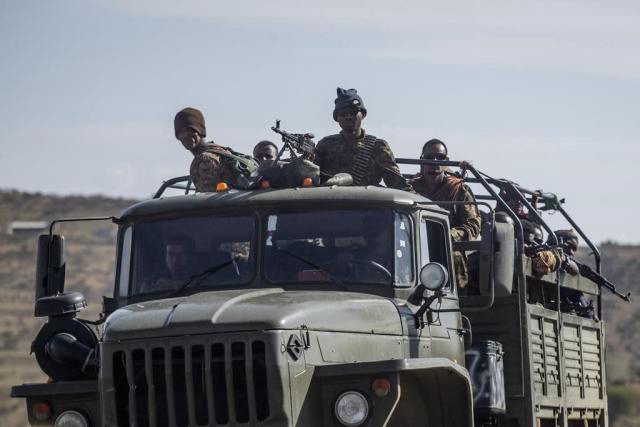Fighting in Northern Ethiopia Shatters Months-Long Truce | The African Exponent.
[ad_1]
Ethiopia’s military has launched a “large-scale” offensive for the first time in a year in the northern Tigray region, Tigray authorities alleged Wednesday, while the government countered that Tigray forces attacked first. It is a significant setback to mediation efforts as millions of people remain starved of food and other needs.
The fighting is a major blow to hopes for peace talks between Prime Minister Abiy Ahmed’s government and the Tigray People’s Liberation Front (TPLF), the party that controls Tigray.
“At 5am today (the TPLF) has attacked on the Eastern Front; from Bisober, Zobel and Tekulshe direction … it has effectively broken the ceasefire,” the government’s communications service said in a statement.
A day earlier, as social media lit up with allegations of troops on the move, the military accused the Tigrayan forces of preparing to attack and cover their tracks by spreading fake news of military movements.
“It has become an open secret that they (the TPLF) are campaigning to incriminate our army,” said the statement, accusing the TPLF of mounting “pre-conflict propaganda”.
In turn, the military command of the Tigrayan forces accused the government of violating the ceasefire, saying in a statement it believed the attack near Kobo, to the south of Tigray, was a diversion and its forces expected a major attack from the west.
The conflict calmed in recent months amid slow-moving mediation efforts. But last week, the spokeswoman for Prime Minister Abiy Ahmed asserted that Tigray authorities were “refusing to accept peace talks,” and this week, Ethiopia’s military warned the public against reporting troop movements.
TPLF leader, Debretsion Gebremichael, in his own statement to the international community, said, “The peace process is being set up to fail” and accused the government of trying to block investigations into war crimes, withhold key services and blockade the region.
A government spokesman did not return a message seeking comment, but the government has repeatedly said it is not blockading Tigray. Ethiopia has tried to block funding for a U.N. enquiry into abuses.
Three residents around Kobo reported hearing heavy weapons in the early morning of Wednesday. They also said there had been movement of Ethiopian soldiers, Amhara special forces and volunteer Fano militia in the past two days.
Redwan Hussein, national security adviser to the prime minister, said the Ethiopian army had shot down a plane carrying weapons to Tigray which entered Ethiopian airspace from neighbouring Sudan. He did not share the location where the plane was shot down. TPLF spokesman, Getachew Reda, in a tweet said the statement was “a blatant lie”.
All sides have committed abuses in the conflict. On Wednesday, the United Nations said Tigray forces “forcibly entered” a World Food Program warehouse in the regional capital, Mekele, and took 12 fuel tankers meant for the delivery of badly needed humanitarian aid.
War erupted in Tigray in November 2020 and spilled into the neighbouring regions of Afar and Amhara a year ago. Last November, Tigrayan forces marched towards Addis Ababa, but were driven back by a government offensive that month.
A ceasefire was announced in March after both sides fought to a bloody stalemate and the government declared a humanitarian truce, allowing badly needed food aid into the region.
In June, Abiy’s government formed a committee to negotiate with the TPLF, and earlier this month the government said it wanted talks “with no preconditions”. Tigray’s government has called for the restoration of services to civilians before talks begin, a call echoed by diplomats.
Tigray has been without banking and communication services since the military pulled out at the end of June. Imports of fuel are restricted, limiting the distribution of aid.
Earlier this month, World Health Organization director-general Tedros Adhanom Ghebreyesus, an ethnic Tigrayan, described the crisis in Tigray as “the worst disaster on Earth” and wondered aloud if the reason global leaders have not responded was due to “the color of the skin of the people in Tigray.”
[ad_2]
Source link

